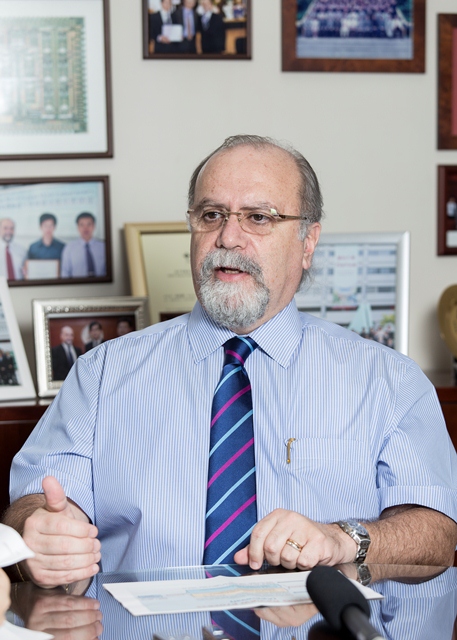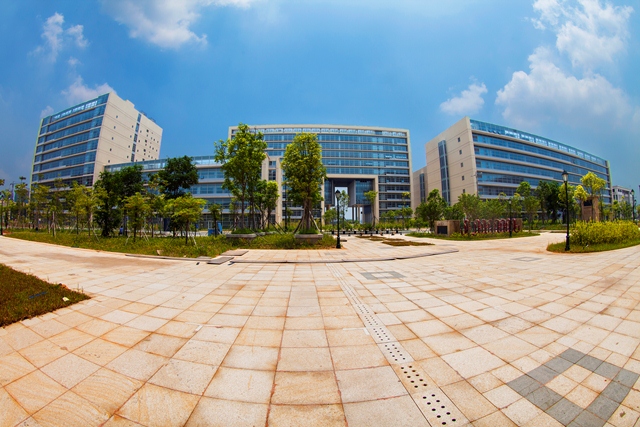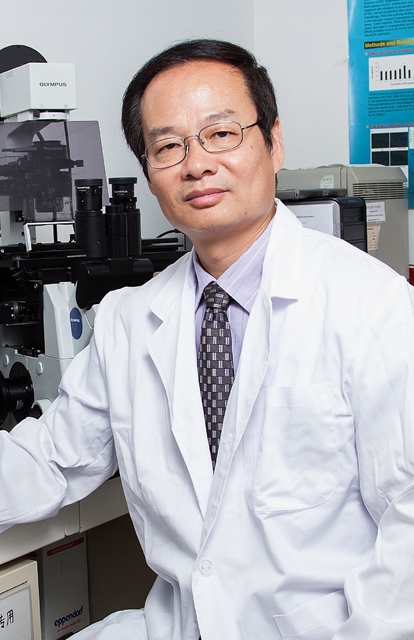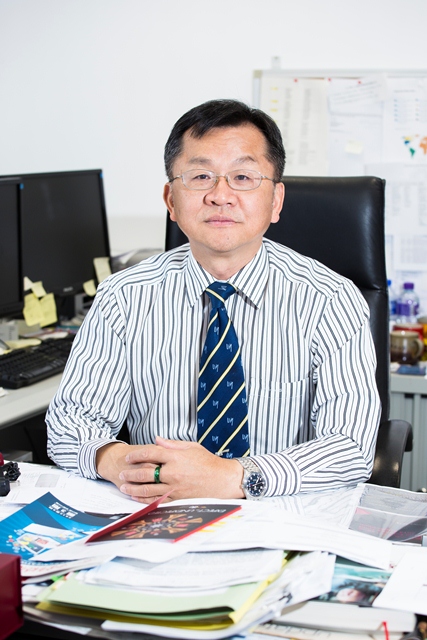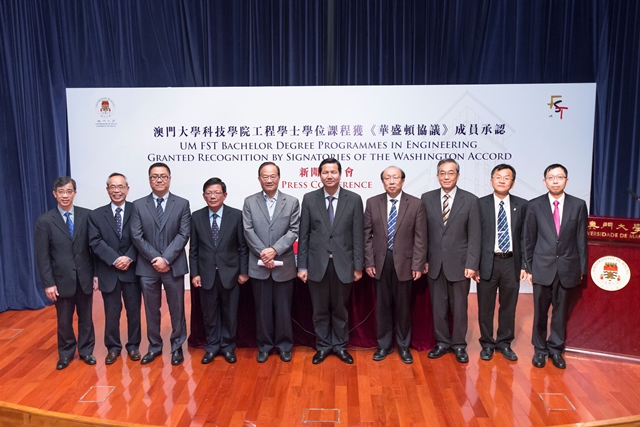Source: umagazine
As a recognised leading public university in the region, the University of Macau (UM) is committed to excellence in teaching and research. Over the past five years, it has made great progress in both areas. Some of the academic programmes offered by the Faculty of Science and Technology (FST) and the Faculty of Business Administration (FBA) have gained international recognition. The number of papers published in high-level SCI-indexed journals has seen an annual increase of 40 per cent. Every year, UM staff and students publish more than 500 high-quality papers, with a citation frequency of over 3,500. UM now ranks among the top ten universities in the world in terms of research in microelectronics, according to the 2014 IEEE international Solid-State Circuits Conference standards for first-author papers. These achievements show that UM has reached international standards in some aspects of teaching and research.
In the future, UM will increase investment in research and formulate new research strategies, in order to develop frontier disciplines with international impact that meet the needs of the Macao society. For instance, the newly established Faculty of Health Sciences will train high-calibre research specialists and make new explorations and innovations in the areas of biomedical sciences and infectious diseases. FST will recruit more high-quality, research-minded postgraduate students to promote research development at the university.
The scientific research base on the new campus will house the two state key laboratories in microelectronics and Chinese medicine; it will also promote research in such areas as medical sciences, energy and environment, as well as information and electronics. UM has established a joint research centre with Peking University, the University of Hong Kong, and Taiwan University. In the future, it will continue to deepen academic and research collaborations with institutions in neighbouring regions. The new campus has ushered in a new era, and with the opportunities it brings, the university is faced with expanding research possibilities.
Vice Rector Rui Martins: New campus brings new opportunities for research
Prof. Rui Martins was appointed UM’s vice rector for research in September 2008. Prof. Martins is a world-renowned expert on microelectronics, and is currently chair professor at UM. Prof. Martins and his research team are dedicated to high-tech microelectronics research, and they have been granted Macao’s first-ever patent in the field.
In this interview, Prof. Martins talks about his vision for UM’s research development.
M: Vice Rector (Research) and Chair Professor Rui Martins
U: umagazine
U: What strategies has UM adopted in recent years to promote research development?
M: We began to support research at UM 20 years ago. Aiming to initiate research in all the areas that were covered by UM, we encouraged our colleagues to present proposals to UM’s Research Committee. Basically everybody could present proposals to the committee. With the revision of the University Charter in 2006 and the appointment of a new rector through open recruitment in 2008, we found that we should try to improve both the quantity and the quality of research. For this reason, we carried out reform on research management. For example, we established the Research & Development Administration Office, which works together with the university’s Research Committee to supervise research. We also initiated a project to provide Multi-Year Research Grant on a competitive basis, with external vetting.
U: Are there any internal criteria for the approval of research proposals?
M: UM upholds academic freedom. In the case of our research support, we don’t have any rule that says our faculty members must go to the department and its dean to present their proposals. No. All faculty members at the level of assistant professor or above can present their proposals directly to the Research Committee. It is totally free and they can present whatever they want to do in their areas of research.
U: How much has UM progressed in teaching and research in recent years?
M: In recent years, UM is committed to improving the quality of teaching. The majority of our faculty members hold PhD degrees, many of which are granted by renowned universities. Our faculty members also have rich international teaching experience and impressive academic backgrounds. UM will continue to recruit more faculty members with PhD degrees in the future.
Both the number and citation frequency of published papers by UM members are on steady increase. Approximately 120 papers were published in 2009. The number rose to 500 (which is one paper per faculty member) in 2013, which is more than four times the number in 2009. According to Thomson Reuters Web of Science, in 2008 and 2009, the citation frequency of UM papers was only 100, but in 2013, it surged to 3,500.
U: What is the greatest challenge faced by UM in research?
M: Research funding is very important for a developing university. We are capable of funding more than 50 per cent of all research proposals, while in Hong Kong it’s usually around 20 per cent. So I think that in terms of funding we are in a good situation. One of our limitations is the number of our faculty members. Although we have recruited over 500 faculty members so far, these faculty members are shared by many areas at UM. The critical mass is not very high in some specific disciplines. In some areas there are usually only one to two professors. Another thing is that Macao is a relatively small city and not well-known in the world, and because of this, sometimes we encounter difficulties in setting up cooperative bridges with other universities in and outside the region.
U: Tell us about the research achievements of the two state key labs.
M: In 2009, UM received the approval for establishing Macao’s first two state key labs, the State Key Laboratory of Analog and Mixed- Signal VLSI (AMS-VLSI Lab), and the State Key Laboratory of Quality Research in Chinese Medicine (QRCM Lab). Both labs have achieved some very good results over the past five years. Because of the AMS-VLSI Lab, UM is now one of the ten universities that have presented the most papers at the Institute of Electrical and Electronics Engineers (IEEE) International solid-State Circuits Conference, which is considered the “Chip Olympics”. Related papers have been ranked Most Popular Papers in the IEEE Xplore database. The QRCM Lab has also done very well. It has been granted 12 Chinese and international patents. It also ranks among the top among all state key labs in China in terms of the number of papers per person published in SCI-indexed journals. In early 2014, the two state key labs passed the mid-stage assessment with flying colours. This and the increased research space on the new campus will allow UM to achieve even better results in these two key areas.
U: Apart from microelectronics, Chinese medicine, and health sciences, are there any other priority research areas at UM?
M: Computer and Information Science is another key area. Rector Wei Zhao is an expert in this field. He is a chief scientist for a project on the Internet of Things (IoT) which is under the 973 Programme, a national research development programme. This shows that UM enjoys a leading position in China in the field of IoT. Robotics and Cybernetics are other key areas. In recent years, we have recruited senior professors from around the world, including mainland China, Portugal, and the United States. These professors have done very well in research in various areas of social sciences. Macaology is one example. Macaology has now become a “world academic brand” of UM. We have also formed a multidisciplinary research team, which is focused on the studies of Macao-related issues and covers many areas. This team has published nearly 100 research papers and over 20 monographs. In the areas of sociology, criminology, and international relations, the number of published papers by UM faculty and students has also seen a marked increase. On the language front, the Chinese, Portuguese and English departments have also done very well. The above areas are all key research areas at UM.
U: How can the Scientific Research Base on the new campus promote research development at UM?
M: The Scientific Research Base on the new campus provides perfect “hardware” and “software” for research development. It also provides new opportunities which we didn’t have on the old campus. For example, there is more space for labs and equipment on the new campus. We are setting up a large number of new biology labs for the Faculty of Health Sciences. There is also a new animal house which allows us to keep animals in a better condition. We will probably also set up a centre for biology research—the P3 Lab, which is designed for research in infectious diseases. With a larger space on the new campus, we may also be able to create one or two spin-off companies from the research projects conducted by the state-key labs.
FHS Chair Professor Ge Wei: “The road is tortuous, but the future is bright.”
Health has always been a topic of great concern to humankind. Leading scientists around the world are constantly trying to crack the code to some of the most challenging medical problems of our time, such as cancer, avian flu, and AIDS. In the past, cutting-edge research in such areas was almost unthinkable for the University of Macau (UM). Thanks to the opportunities brought by the new campus, UM established the Faculty of Health Sciences (FHS) in 2012, filling gaps in these areas. FHS hopes to promote the dissemination of knowledge in key areas of modern biomedicine and health sciences through cutting-edge research. In this article, we interview Chair Professor Ge Wei, interim dean of FHS who assisted with the founding of the faculty, about the FHS’s talent development strategy, research areas, and future challenges.
G: Ge Wei, chair professor and interim dean of FHS
U: umagazine
U: How does FHS position itself?
G: FHS is a research-focused faculty. We don’t expect to become a world-class faculty overnight; we hope that in the near future we could develop into a faculty with international influence and an important status in Macao and in the neighbouring regions.
U: What advantages does FHS have?
G: Research in modern biology and biomedicine relies heavily on large equipment and state-of-the-art technologies. It also requires considerable investment and space. Apart from regular labs, we are going to have a 3,000m2 animal lab building on the new campus to conduct cutting-edge research. These are the advantages in space and facilities. Another advantage we have is funding. The university provides great support, in funding and in research direction. Because of these advantages, I am full of confidence in the faculty’s future development.
U: What are FHS’s main research areas?
G: We will establish five research centres, covering FHS’s main research areas, including cancer; reproduction, development and ageing; molecular medicine; immunology and infectious diseases; and neurodegenerative diseases. These are the hottest areas of research in the international medical community. The Cancer Centre and the Centre of Reproduction, Development and Ageing have already been established. Preparations for the establishment of the three other centres are underway. Our bachelor’s and postgraduate programmes will mainly focus on these five areas.
U: Will cancer be FHS’s key research area in the future?
G: Of the ten faculty members we’ve recruited so far, nearly half of them study cancer. The future dean of FHS is also an expert on cancer. So, yes, cancer is definitely going to be the most important key area. In the long run, we hope to establish a one-stop cancer centre at UM which integrates basic research, clinical research, and clinical treatment. We also hope to establish a state key lab that specialises in cancer research, to improve the university’s level of research in this area. Our dream is that one day cancer patients from Macao, mainland China and other neighbouring regions will think of Macao as their first choice.
U: Could you tell us about FHS’s talent development strategy?
G: FHS is a faculty with no departments. We plan to have the Bachelor of Science (Biomedical Sciences) Programme, which is currently offered by UM’s Institute of Chinese Medical Sciences, switched to our faculty in 2015. We won’t recruit too many undergraduates. Our goal is 20 per year. We will focus on training high-calibre PhD students. We hope those who complete undergraduate studies in our faculty can move directly to PhD studies, and that means we must make sure our curriculum well prepares them for PhD studies. For instance, undergraduate students may need to participate in research projects that interest them in the lab or research centre with individual professors. And if they develop a strong interest in research, they would naturally want to pursue PhD studies. This is also an important way for us to support the university’s research and internship education, which is one component of the “4-in-1” model of education. When students are having a class in the classroom, they are at the receiving end of knowledge, but when they are conducting research in the lab, they are creating knowledge. This model of education is very different.
U: Where do FSH’s faculty members come from?
G: Our faculty members come from around the world, including the United States, the United Kingdom, New Zealand, Singapore, South Korea, and Hong Kong. The excellent environment on the new campus and the generous resource support from the university are certainly a lure. Their research areas are all of international concern, such as cancer, public health, AIDS, and Alzheimer’s disease. There are senior ones, middle-aged ones, and also young ones. The benefit of this composition is that young faculty members can learn from their senior colleagues, in how to set up a lab, how to train postgraduate students, and how to publish papers.
U: Is it difficult to recruit so many faculty members in such a short time?
G: Apart from teaching and research, one of our most important tasks in the future is to recruit more faculty members. FHS started from zero, and the university wants us to recruit 60 professors within five years, which means 10 to 15 every year. It is not easy. And apart from faculty members, we also need to recruit a large number of middle-level research and technical staff, such as post-doctoral fellows, experienced lab technicians, and research assistants. Macao is facing an acute shortage of these professionals, so it’s not easy.
U: What is the biggest challenge for FHS?
G: Our first challenge is to recruit first-rate PhD students. The students we’ve recruited so far are of very high quality, but it would be very difficult to meet the university’s requirement to recruit hundreds of PhD students within five years. A bigger challenge is to make sure that all the PhD students are of high quality. I think even universities in Hong Kong would find it hard to achieve that. Another challenge is that we need to attract first-rate post-doctoral fellows. But no matter how difficult, it is a goal we will work together to achieve. Overall, I think the road is tortuous, but the future is bright.
FST Dean Prof Philip Chen: “International recognition of our programmes is of great significance”
UM’s Faculty of Science and Technology (FST) has made remarkable progress over the past 30 years. It now ranks No. 1 among all the faculties at UM in terms of published papers, accounting for approximately 50 per cent of all published papers by UM. Earlier this year, three bachelor’s degree programmes offered by FST were recognised by the signatories to the Washington Accord, which is the most authoritative international accreditation agreement for undergraduate engineering degrees. The accreditation shows international recognition of the quality of engineering education at FST; it also means that students of the three programmes will be eligible to obtain professional qualifications in numerous signatories to the Washington Accord after graduation. In this article, we interview FST Dean Prof. Philip Chen, who has played an instrumental role in gaining the accreditation. Prof. Chen discusses how the three programmes passed extremely stringent evaluation by the Washington Accord, and what implications the accreditation has for FST’s future development.
Offering Quality Programmes to Increase Students’ Competitiveness
Hardly had we entered his office when Prof. Chen extended both his hands in warm welcome. Less than 300 square feet in size, his office was overflowing with documents. “Not enough space, but lots of stuff,” Prof. Chen smiled, a little embarrassed about the mess. “FST will start moving onto the new campus next week, and then we will have bigger offices, classrooms, and research facilities.” When Prof. Chen joined UM in January 2010 as the dean of FST, he was already a world-renowned expert on computational intelligence and intelligent systems with more than 20 years of professional experience. He was the first active scholar from the Greater China region to be elected president of the Systems, Man, and Cybernetics Society (SMC) of the Institute of Electrical and Electronics Engineers (IEEE). He is also the editor-in-chief of the IEEE Transactions on Systems, Man, and Cybernetics: Systems.
FST is committed to offering quality programmes through its five departments: Department of Civil and Environmental Engineering, Department of Computer and Information Science, Department of Electrical and Computer Engineering, Department of Electromechanical Engineering, and Department of Mathematics. “Apart from offering quality programmes, we also value exchange and collaboration with institutions for science, technology and engineering, to make sure that the technical expertise students acquire through our programmes meet the needs of society,” Prof. Chen said. “It helps to increase our students’ competitiveness on the job market, and also we hope that through nurturing graduates that meet society’s needs, we can develop FST into a local education centre in science, technology and engineering.”
Accreditation Process Extremely Complex
Earlier this year, three bachelor’s degree programmes offered by FST, namely Bachelor of Science in Civil Engineering, Bachelor of Science in Electrical and Computer Engineering, and Bachelor of Science in Electromechanical Engineering, were recognised by the signatories to the Washington Accord. Students starting these three programmes in the 2011/2012 academic year or later, as well as those starting these programmes before 2011 and completing all required courses, will be eligible to obtain professional qualifications in numerous signatories to the Washington Accord after graduation. These are the first degree programmes in Macao that have been recognised under the Washington Accord. It is also the first out-of-jurisdiction accreditation meeting the Washington Accord standards. When Prof. Chen joined UM four years ago, he made a quiet vow to himself to work to bring FST’s academic programmes up to international standards. Thanks to everyone’s joint effort, his wish has come true despite the difficulties encountered in the process. “The process was very complex,” said Prof. Chen. “What was the most difficult was that there were many steps, and every step was closely linked to the next one. First we needed to identify our educational objectives. Then we needed to specify our expectations for graduates of different programmes, how we planned to arrange the courses to achieve expected outcomes, how to realise quality assurance and continuous improvement, how to help students in their character development, and how to ensure academic integrity. And these required us to position every programme clearly and uniquely. Curriculum design needed to be done in a systematic way to meet the relevant standards. Our faculty members and their assistants collected and sorted through a large amount of data and portfolios, and shared the content of each course.”
But that’s not all. Before gaining recognition under the Washington Accord, FST needed to first gain recognition from members of the Hong Kong Institution of Engineers (HKIE). “The three programmes are the first in the world to be recognised in this way,” Prof. Chen explained. “Macao is not a signatory to the Washington Accord, so we couldn’t submit the application to the Washington Accord directly. Hong Kong is a signatory, so we had to go through the strict evaluation by HKIE first and only then could we submit the application to the Washington Accord, and eventually we gained recognition from all the signatories. We are very grateful to HKIE for supporting us and having faith in us. We also received great support from the Macau Institution of Engineers (MIE), and we feel honoured that we built a bridge of friendship between HKIE and MIE in the process.”
Aiming for International Standard
“This is a great achievement of many years of hard work,” Prof. Chen said. “The three programmes have gained recognition under the Washington Accord because first, the quality of these programmes meets the standards of the Washington Accord, and second, the quality of our faculty members and their requirements for the programmes also meet international standards. Of course, the joint effort of the various parties, including our alumni and academic consultants, has also been indispensable to our success.” Prof. Chen told us that in addition to the three programmes, FST’s Computer and Information programme, which has already received accreditation from HKIE, is expected to receive accreditation under the Seoul Accord—an international accreditation alliance that accredits Computer and Information Science programmes—this summer.
Prof. Chen is full of confidence in FST’s future. “After we move onto the new campus, FST will have more labs and lab equipment, and this will provide favourable conditions for us to further enhance our teaching,” Prof. Chen says. “More space also means we will be able to recruit more high-quality, research-minded postgraduates to promote research development at the university.”
International Recognition of Academic Programmes
Three bachelor’s degree programmes offered by FST have been recognised by the signatories to the Washington Accord. Graduates of the three programmes will be eligible to obtain professional qualifications in numerous signatories to the Washington Accord. They will also be eligible to become Corporate Member by participating in the engineering graduate training scheme “A” as a Graduate Member of the Hong Kong Institution of Engineers. The Corporate Member can enjoy recognition under two international engineering agreements (the International Professional Engineers Agreement, and the APEC Engineer Agreement) and 22 qualification accreditation agreements.
Graduates of the Faculty of Business Administration’s (FBA) Bachelor of Science (Accounting—Professional Accountancy) programme and Bachelor of Science (Accounting—Accounting and Information Management) programme can gain exemptions from CPA Australia’s examinations in some subjects. The Bachelor of Science (Accounting— Professional Accountancy) programme has also gained recognition from the Hong Kong Institute of Certified Public Accountants (HKICPA). Graduates of this programme can directly apply for professional qualification programmes. The Bachelor of Science in Finance programme has become the first programme in the Asia-Pacific region to be recognised under the University Recognition Program of CFA Institute, which is a world-renowned global association of investment professionals. This gives graduates of this programme a competitive edge as investment experts, scholars, and other members of the institute from around the world can see the recognition on the CFA Institute’s website.
The fact that some of UM’s academic programmes have gained international recognition is of great significance. It shows that UM has reached international standards in some aspects of teaching. In addition to providing fresh momentum for the university to progress towards a world-class institution, it also proves that UM’s commitment to providing quality undergraduate education and building an outstanding faculty team is beginning to pay off.
Signatories to the Washington Accord include the United States, the United Kingdom, Canada, Ireland, Australia, New Zealand, Hong Kong China, South Africa, Japan, Singapore, Taipei, South Korea, Malaysia, Turkey, and Russia. Countries that have provisional signatory status include Bangladesh, China, India, Pakistan, Sir Lanka, and the Philippines.
